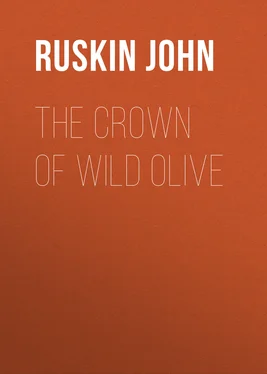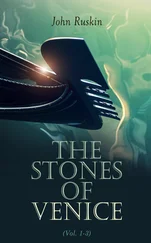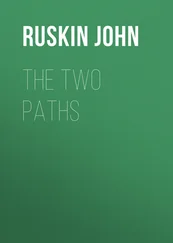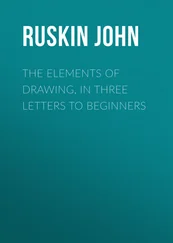John Ruskin - The Crown of Wild Olive
Здесь есть возможность читать онлайн «John Ruskin - The Crown of Wild Olive» — ознакомительный отрывок электронной книги совершенно бесплатно, а после прочтения отрывка купить полную версию. В некоторых случаях можно слушать аудио, скачать через торрент в формате fb2 и присутствует краткое содержание. Жанр: foreign_antique, foreign_home, literature_19, visual_arts, на английском языке. Описание произведения, (предисловие) а так же отзывы посетителей доступны на портале библиотеки ЛибКат.
- Название:The Crown of Wild Olive
- Автор:
- Жанр:
- Год:неизвестен
- ISBN:нет данных
- Рейтинг книги:4 / 5. Голосов: 1
-
Избранное:Добавить в избранное
- Отзывы:
-
Ваша оценка:
- 80
- 1
- 2
- 3
- 4
- 5
The Crown of Wild Olive: краткое содержание, описание и аннотация
Предлагаем к чтению аннотацию, описание, краткое содержание или предисловие (зависит от того, что написал сам автор книги «The Crown of Wild Olive»). Если вы не нашли необходимую информацию о книге — напишите в комментариях, мы постараемся отыскать её.
The Crown of Wild Olive — читать онлайн ознакомительный отрывок
Ниже представлен текст книги, разбитый по страницам. Система сохранения места последней прочитанной страницы, позволяет с удобством читать онлайн бесплатно книгу «The Crown of Wild Olive», без необходимости каждый раз заново искать на чём Вы остановились. Поставьте закладку, и сможете в любой момент перейти на страницу, на которой закончили чтение.
Интервал:
Закладка:
Nay, but (it is asked) how is that an unfair advantage? Has not the man who has worked for the money a right to use it as he best can? No; in this respect, money is now exactly what mountain promontories over public roads were in old times. The barons fought for them fairly:—the strongest and cunningest got them; then fortified them, and made everyone who passed below pay toll. Well, capital now is exactly what crags were then. Men fight fairly (we will, at least, grant so much, though it is more than we ought) for their money; but, once having got it, the fortified millionaire can make everybody who passes below pay toll to his million, and build another tower of his money castle. And I can tell you, the poor vagrants by the roadside suffer now quite as much from the bag-baron, as ever they did from the crag-baron. Bags and crags have just the same result on rags. I have not time, however, to-night to show you in how many ways the power of capital is unjust; but this one great principle I have to assert—you will find it quite indisputably true—that whenever money is the principal object of life with either man or nation, it is both got ill, and spent ill; and does harm both in the getting and spending; but when it is not the principal object, it and all other things will be well got, and well spent. And here is the test, with every man, of whether money is the principal object with him, or not. If in mid-life he could pause and say, "Now I have enough to live upon, I'll live upon it; and having well earned it, I will also well spend it, and go out of the world poor, as I came into it," then money is not principal with him; but if, having enough to live upon in the manner befitting his character and rank, he still wants to make more, and to die rich, then money is the principal object with him, and it becomes a curse to himself, and generally to those who spend it after him. For you know it must be spent some day; the only question is whether the man who makes it shall spend it, or some one else. And generally it is better for the maker to spend it, for he will know best its value and use. This is the true law of life. And if a man does not choose thus to spend his money, he must either hoard it or lend it, and the worst thing he can generally do is to lend it; for borrowers are nearly always ill-spenders, and it is with lent money that all evil is mainly done, and all unjust war protracted.
For observe what the real fact is, respecting loans to foreign military governments, and how strange it is. If your little boy came to you to ask for money to spend in squibs and crackers, you would think twice before you gave it him; and you would have some idea that it was wasted, when you saw it fly off in fireworks, even though he did no mischief with it. But the Russian children, and Austrian children, come to you, borrowing money, not to spend in innocent squibs, but in cartridges and bayonets to attack you in India with, and to keep down all noble life in Italy with, and to murder Polish women and children with; and that you will give at once, because they pay you interest for it. Now, in order to pay you that interest, they must tax every working peasant in their dominions; and on that work you live. You therefore at once rob the Austrian peasant, assassinate or banish the Polish peasant, and you live on the produce of the theft, and the bribe for the assassination! That is the broad fact—that is the practical meaning of your foreign loans, and of most large interest of money; and then you quarrel with Bishop Colenso, forsooth, as if he denied the Bible, and you believed it! though, wretches as you are, every deliberate act of your lives is a new defiance of its primary orders; and as if, for most of the rich men of England at this moment, it were not indeed to be desired, as the best thing at least for them , that the Bible should not be true, since against them these words are written in it: 'The rust of your gold and silver shall be a witness against you, and shall eat your flesh, as it were fire.'
III. I pass now to our third condition of separation, between the men who work with the hand, and those who work with the head.
And here we have at last an inevitable distinction. There must be work done by the arms, or none of us could live. There must be work done by the brains, or the life we get would not be worth having. And the same men cannot do both. There is rough work to be done, and rough men must do it; there is gentle work to be done, and gentlemen must do it; and it is physically impossible that one class should do, or divide, the work of the other. And it is of no use to try to conceal this sorrowful fact by fine words, and to talk to the workman about the honourableness of manual labour and the dignity of humanity. That is a grand old proverb of Sancho Panza's, 'Fine words butter no parsnips;' and I can tell you that, all over England just now, you workmen are buying a great deal too much butter at that dairy. Rough work, honourable or not, takes the life out of us; and the man who has been heaving clay out of a ditch all day, or driving an express train against the north wind all night, or holding a collier's helm in a gale on a lee-shore, or whirling white hot iron at a furnace mouth, that man is not the same at the end of his day, or night, as one who has been sitting in a quiet room, with everything comfortable about him, reading books, or classing butterflies, or painting pictures. If it is any comfort to you to be told that the rough work is the more honourable of the two, I should be sorry to take that much of consolation from you; and in some sense I need not. The rough work is at all events real, honest, and, generally, though not always, useful; while the fine work is, a great deal of it, foolish and false as well as fine, and therefore dishonourable; but when both kinds are equally well and worthily done, the head's is the noble work, and the hand's the ignoble; and of all hand work whatsoever, necessary for the maintenance of life, those old words, 'In the sweat of thy face thou shalt eat bread,' indicate that the inherent nature of it is one of calamity; and that the ground, cursed for our sake, casts also some shadow of degradation into our contest with its thorn and its thistle; so that all nations have held their days honourable, or 'holy,' and constituted them 'holydays' or 'holidays,' by making them days of rest; and the promise, which, among all our distant hopes, seems to cast the chief brightness over death, is that blessing of the dead who die in the Lord, that 'they rest from their labours, and their works do follow them.'
And thus the perpetual question and contest must arise, who is to do this rough work? and how is the worker of it to be comforted, redeemed, and rewarded? and what kind of play should he have, and what rest, in this world, sometimes, as well as in the next? Well, my good working friends, these questions will take a little time to answer yet. They must be answered: all good men are occupied with them, and all honest thinkers. There's grand head work doing about them; but much must be discovered, and much attempted in vain, before anything decisive can be told you. Only note these few particulars, which are already sure.
As to the distribution of the hard work. None of us, or very few of us, do either hard or soft work because we think we ought; but because we have chanced to fall into the way of it, and cannot help ourselves. Now, nobody does anything well that they cannot help doing: work is only done well when it is done with a will; and no man has a thoroughly sound will unless he knows he is doing what he should, and is in his place. And, depend upon it, all work must be done at last, not in a disorderly, scrambling, doggish way, but in an ordered, soldierly, human way—a lawful way. Men are enlisted for the labour that kills—the labour of war: they are counted, trained, fed, dressed, and praised for that. Let them be enlisted also for the labour that feeds: let them be counted, trained, fed, dressed, praised for that. Teach the plough exercise as carefully as you do the sword exercise, and let the officers of troops of life be held as much gentlemen as the officers of troops of death; and all is done: but neither this, nor any other right thing, can be accomplished—you can't even see your way to it—unless, first of all, both servant and master are resolved that, come what will of it, they will do each other justice. People are perpetually squabbling about what will be best to do, or easiest to do, or adviseablest to do, or profitablest to do; but they never, so far as I hear them talk, ever ask what it is just to do. And it is the law of heaven that you shall not be able to judge what is wise or easy, unless you are first resolved to judge what is just, and to do it. That is the one thing constantly reiterated by our Master—the order of all others that is given oftenest—'Do justice and judgment.' That's your Bible order; that's the 'Service of God,' not praying nor psalm-singing. You are told, indeed, to sing psalms when you are merry, and to pray when you need anything; and, by the perversion of the Evil Spirit, we get to think that praying and psalm-singing are 'service.' If a child finds itself in want of anything, it runs in and asks its father for it—does it call that, doing its father a service? If it begs for a toy or a piece of cake—does it call that serving its father? That, with God, is prayer, and He likes to hear it: He likes you to ask Him for cake when you want it; but He doesn't call that 'serving Him.' Begging is not serving: God likes mere beggars as little as you do—He likes honest servants, not beggars. So when a child loves its father very much, and is very happy, it may sing little songs about him; but it doesn't call that serving its father; neither is singing songs about God, serving God. It is enjoying ourselves, if it's anything; most probably it is nothing; but if it's anything, it is serving ourselves, not God. And yet we are impudent enough to call our beggings and chauntings 'Divine Service:' we say 'Divine service will be "performed"' (that's our word—the form of it gone through) 'at eleven o'clock.' Alas!—unless we perform Divine service in every willing act of our life, we never perform it at all. The one Divine work—the one ordered sacrifice—is to do justice; and it is the last we are ever inclined to do. Anything rather than that! As much charity as you choose, but no justice. 'Nay,' you will say, 'charity is greater than justice.' Yes, it is greater; it is the summit of justice—it is the temple of which justice is the foundation. But you can't have the top without the bottom; you cannot build upon charity. You must build upon justice, for this main reason, that you have not, at first, charity to build with. It is the last reward of good work. Do justice to your brother (you can do that, whether you love him or not), and you will come to love him. But do injustice to him, because you don't love him; and you will come to hate him. It is all very fine to think you can build upon charity to begin with; but you will find all you have got to begin with, begins at home, and is essentially love of yourself. You well-to-do people, for instance, who are here to-night, will go to 'Divine service' next Sunday, all nice and tidy, and your little children will have their tight little Sunday boots on, and lovely little Sunday feathers in their hats; and you'll think, complacently and piously, how lovely they look! So they do: and you love them heartily and you like sticking feathers in their hats. That's all right: that is charity; but it is charity beginning at home. Then you will come to the poor little crossing-sweeper, got up also,—it, in its Sunday dress,—the dirtiest rags it has,—that it may beg the better: we shall give it a penny, and think how good we are. That's charity going abroad. But what does Justice say, walking and watching near us? Christian Justice has been strangely mute, and seemingly blind; and, if not blind, decrepit, this many a day: she keeps her accounts still, however—quite steadily—doing them at nights, carefully, with her bandage off, and through acutest spectacles (the only modern scientific invention she cares about). You must put your ear down ever so close to her lips to hear her speak; and then you will start at what she first whispers, for it will certainly be, 'Why shouldn't that little crossing-sweeper have a feather on its head, as well as your own child?' Then you may ask Justice, in an amazed manner, 'How she can possibly be so foolish as to think children could sweep crossings with feathers on their heads?' Then you stoop again, and Justice says—still in her dull, stupid way—'Then, why don't you, every other Sunday, leave your child to sweep the crossing, and take the little sweeper to church in a hat and feather?' Mercy on us (you think), what will she say next? And you answer, of course, that 'you don't, because every body ought to remain content in the position in which Providence has placed them.' Ah, my friends, that's the gist of the whole question. Did Providence put them in that position, or did you ? You knock a man into a ditch, and then you tell him to remain content in the 'position in which Providence has placed him.' That's modern Christianity. You say—' We did not knock him into the ditch.' How do you know what you have done, or are doing? That's just what we have all got to know, and what we shall never know, until the question with us every morning, is, not how to do the gainful thing, but how to do the just thing; nor until we are at least so far on the way to being Christian, as to have understood that maxim of the poor half-way Mahometan, 'One hour in the execution of justice is worth seventy years of prayer.'
Читать дальшеИнтервал:
Закладка:
Похожие книги на «The Crown of Wild Olive»
Представляем Вашему вниманию похожие книги на «The Crown of Wild Olive» списком для выбора. Мы отобрали схожую по названию и смыслу литературу в надежде предоставить читателям больше вариантов отыскать новые, интересные, ещё непрочитанные произведения.
Обсуждение, отзывы о книге «The Crown of Wild Olive» и просто собственные мнения читателей. Оставьте ваши комментарии, напишите, что Вы думаете о произведении, его смысле или главных героях. Укажите что конкретно понравилось, а что нет, и почему Вы так считаете.












